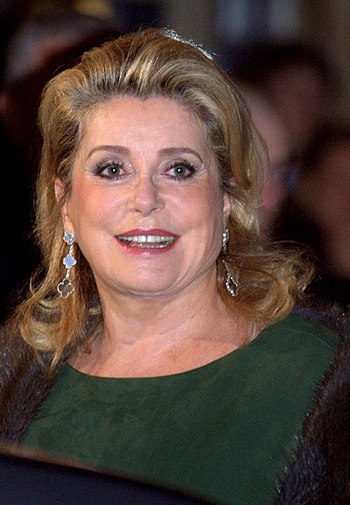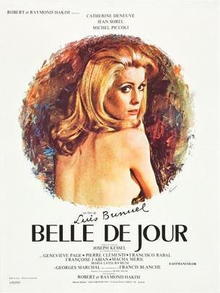| Français : Catherine Deneuve à la cérémonie des César du cinéma. (Photo credit: Wikipedia) |
| English: Fanny Ardant, French actress, at the 2009 Cannes Film Festival (Photo credit: Wikipedia) |
| Belle de Jour (film) (Photo credit: Wikipedia) |
| French actress Catherine Deneuve arriving at the Hotel Adlon, Berlin (Photo credit: Wikipedia) |
| Cover of The Umbrellas of Cherbourg |
| Cover of Fanny Ardant |
Among the great
pleasures that stick in my mind from the 1960s and 1970s are some great French
films which happened to star wonderfully
beautiful young actresses. These memories were recalled to me yesterday when I
successively watched two fairly recent films starring Fanny Ardant and
Catherine Deneuve, now women in their sixties and seventies, still beautiful,
even more accomplished as actresses from their extraordinary careers in the
making of hundreds of films, and still able to carry the theme of any script
against all-comers.
Fanny Ardant I remembered as the remarkably seductive Woman Next Door, a sensation when it was
released in 1981, when she was 36. Her
new film, one of more than 70 to her credit, is called in English Bright Day Ahead. It was made in 2011 when she was 65. She plays
a retired dentist who, to fill in her time, has undertaken to join a ginger
group for the aged, something that does not put her at ease, but that she
persists in mainly as a way of getting out of the house. There she meets a
good-looking, virile, young man who is in the habit of sort of collecting
female conquests, and this retired
dentist, so reserved and self-contained, and yet so lovely, gradually becomes one of those. Rather to his
surprise, and to hers, she responds voraciously to his embraces, but at first
withdraws, surprised at herself, and rather dismayed. But having tasted a little
of that forbidden fruit, she develops a yen for it, becomes somewhat reckless
in her attachment, meeting the younger man in places where they can be seen,
and so the affaire comes to the knowledge of her husband, with whom she has
fallen into an ordinary, loving, but unexciting partnership.
The film among other virtues, is a lesson in how aging
these days need not be accompanied by physical degeneration. This retired
dentist is instantly credible as the
lover of a younger man, and credible, too are her occasional withdrawals, her
dismay at what she is doing as much as her delight in it, and, of course, it leads
to a denouement for her husband and herself that is more or less inevitable for
two people who are not children, even though they might both have acted rather
like teenagers for a few weeks or months of their many years together.
Ardant in her first films was regarded more as an ornament
than as a great actress, but with experience, acceptance of her skills grew as
well, and in more recent years she has even gotten into the direction and
writing of films, as well as providing beautiful performances in many varying
roles.
Ardant had a long relationship with Francois Truffaut, one
of three men with each of whom she bore a daughter, although she apparently never married. Not
yet anyway.
Catherine Deneuve is another whose earlier years were
marked by her as an ornament: a woman of lustrous beauty, she became the face
of (was it?) Chanel No. 5, the French perfume, and was associated in the public
mind with some of the handsome young men of
her day, such as Roger Vadim and Marcello Mastroianni, by both of whom
she produced children, although she married just once, to British photographer,
David Bailey. In addition she has a long history of doing good works, for,
among others, UNESCO and Amnesty International.
In the wonderful film Les
Parapluies de Cherbourg, directed by Jacques
Demy, with music by Michel Legrand (who later became familiar in Montreal, on
many visits), Deneuve, a 20-year-old, played the part of a sixteen year old
girl who had a love affair with a young man who went off to war. Subsequently
they each got married to other partners, and at the end of the film they met some
years later in a brief encounter in a gas station.
This film was made in 1963, six years after Deneuve appeared in her first film, but it was certainly not the last remarkable film in her career, for she followed it with an appearance in Roman Polanski’s Repulsion, the following year, and in the superb drama Belle de Jour made by Louis Bunuel in 1967. This acquaintance with these master film-makers certainly did not dim the young star’s stature.
This film was made in 1963, six years after Deneuve appeared in her first film, but it was certainly not the last remarkable film in her career, for she followed it with an appearance in Roman Polanski’s Repulsion, the following year, and in the superb drama Belle de Jour made by Louis Bunuel in 1967. This acquaintance with these master film-makers certainly did not dim the young star’s stature.
By this time the actress, now 7l, has appeared in more than
100 films. The prolific output of these two actresses no doubt has something to
do with their proficiency in languages, for in addition to their native French,
both are said to be fluent in English and Italian, and Deneuve in addition
almost fluent in German.
In the new film I saw yesterday, made last year, Deneuve,
although still an attractive woman, is no longer the great beauty of her
younger days. She has filled out considerably, but her skills as an actress,
as with Ardant, seem to have improved,
if anything, and in Elle s’en Va (in
English On My Way) she plays the
proprietor of a failing restaurant in the Sarthe district of France, who one
night, for relief goes for a drive, and just keeps driving. Somehow or other
--- this really lacks credibility --- she runs into a reunion of contestants for
a Miss France contest from the 1960s where she reluctantly exchanges reminiscences with other contestants, who
seem to remember her more clearly than she remembers them. Thereafter she
receives a panic-stricken call from her hyper- active daughter to come and take
care of her grandson, while the daughter goes to Brussels in search of a job.
After long sequences in which the film proves that not only North American
teens and pre-teens are impossible in their behaviour, it ends up with a
bizarre family scene where she finds a new man of her own age, reconciles with
a daughter who earlier had been able to communicate only in a rage, and finds
herself the object of her grandson’s affection, in replacement for his anger.
Deneuve in this film, like Ardant in hers, shows no sign
of diminishing in vigour with the advancing years, and I expect, if writers can
be found who are interested in the older generations, we can expect to continue
to watch them for many years to come.






No comments:
Post a Comment